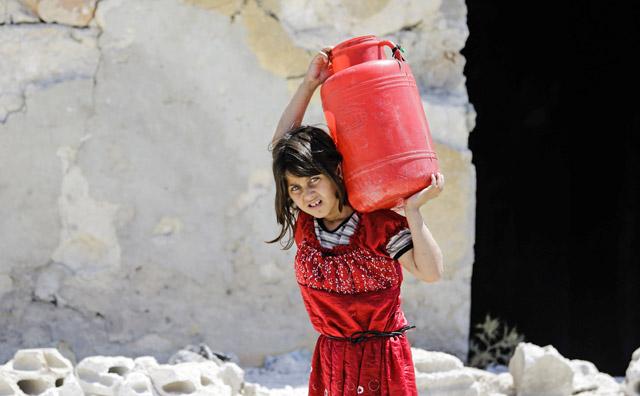You are here
‘Jordan has key interest in restoring security in Syria’
By Mohammad Ghazal - Jul 07,2017 - Last updated at Jul 07,2017

A Syrian girl carries a large jug of water on her back while on her way home, in the Kallaseh district of the northern city of Aleppo, on Wednesday (AFP photo)
AMMAN — Jordan on Thursday said it has a “key interest” in the restoration of stability and security in Syria, downplaying accusations by the Syrian opposition of attempts to obstruct opposition groups’ participation in the 5th international meeting on Syria in Astana.
“Jordan is taking part in the Astana meetings as an observer, upon an invitation from Russia. Jordan is directly impacted by the situation in Syria and has a key interest in restoring security and stability in Syria,” Minister of State for Media Affairs Mohammad Momani told The Jordan Times on Thursday.
The fifth international meeting on Syria took place in Kazakhstan’s capital Astana on July 4 and 5.
The meeting brought together the delegations from the three guarantor states — Russia, Iran and Turkey — as well as the Syrian sides and the United Nations teams. Jordan and the US attended the meeting as observers.
During the meeting, Ahmed Berry, chief of staff brigadier general of the Free Syrian Army (FSA), who was also heading the Syrian opposition, claimed that the US and Jordan hampered the talks by preventing representatives of the Southern Front of the opposition in Syria from attending the Astana meeting, according to media reports.
“Hundreds of statements have been made by many officers in the field over the past years… these statements are not necessarily accurate… They are constantly changing and are at times contradictory…”, Momani, who is also the government’s spokesperson, said.
Jordan is interested in the halt of escalation in all of Syria, not only in some specific parts of the country, and it has been deploying its political tools and its ties with many Syrians to attain security and stability in Syria. This also aims to guarantee stability and security at the southern Syrian borders with Jordan, he added.
“Stability and security in Syria, and creating an environment which allows the return of the refugees, is what concerns us all,” the minister said.
As Jordan is making strides in uprooting terrorism in general and Daesh in particular, it is “fundamental” to look into what needs to be done after this stage, Momani said, adding that Syria is concerned with taking some political steps in the post-terrorism era.
During the talks held on Wednesday, Russia, Turkey and Iran failed to finalise an agreement on the creation of four de-escalation zones in Syria, after Ankara raised objections, diplomats said, according to Reuters.
Russia and Iran, which back President Bashar Assad’s government, and Turkey, which supports some of the rebels, aim to reach a consensus on the zones by the end of August, when their delegations are set to meet again in the Kazakh capital.
In May, Jordan said it was not part of the agreement signed by Russia, Iran and Turkey in Astana to create de-escalation zones in Syria. The three countries signed the deal with the aim of ending the fighting in Syria.
The zones, which aim to reduce tensions, will be set up in four areas, namely in Idlib province and neighbouring areas — Latakia, Hama and Aleppo — to the north of Homs, East Ghouta and some provinces in southern Syria — Daraa and Quneitra — Russian News Agency TASS reported.
Related Articles
ANKARA — Russian President Vladimir Putin will next week host Turkish and Iranian counterparts Recep Tayyip Erdogan and Hassan Rouhani for s
AMMAN — Jordan is not part of the agreement signed in the Kazakh capital Astana to create deescalation zones in Syria, a top government offi
AMMAN — Jordan has participated as an observer in a technical meeting in Kazakhstan's capital Astana to discuss in detail the implementation















